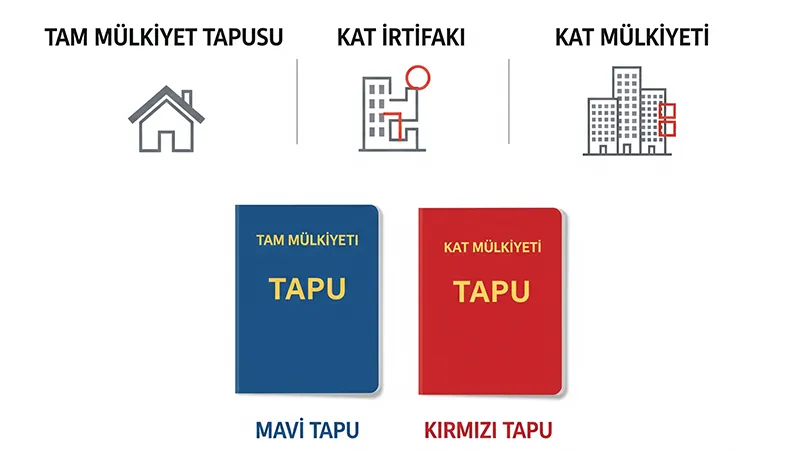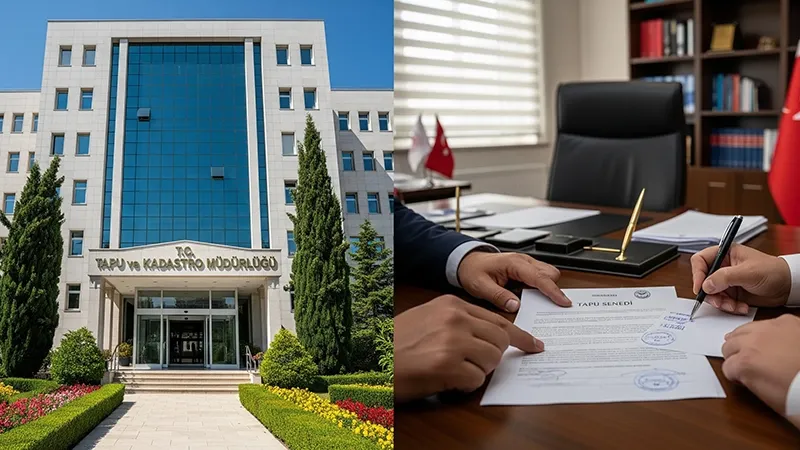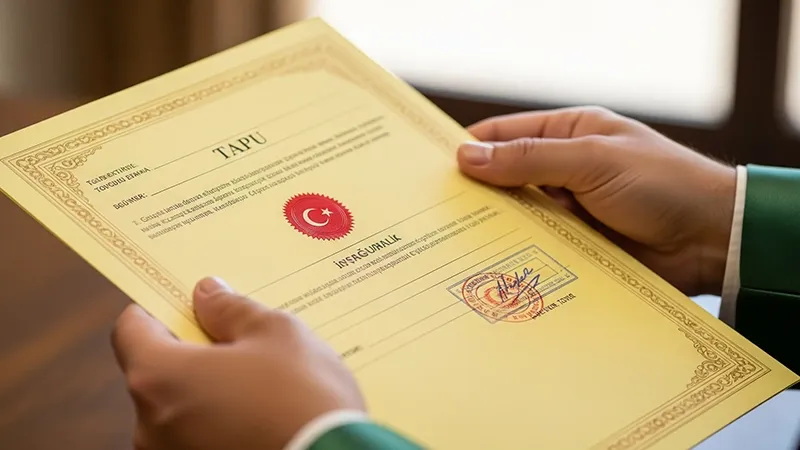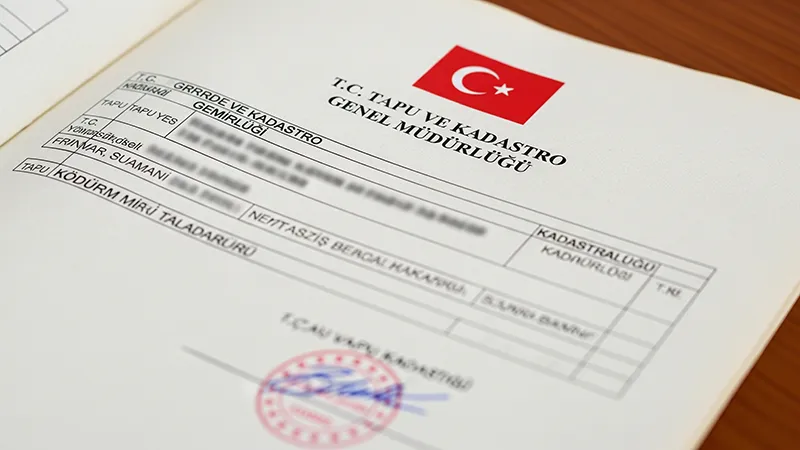TAPU, or "Tapu Senedi," is the official title deed in Turkey, serving as the definitive legal instrument and proof of property ownership. This document goes beyond a mere certificate; TAPU forms the core of property rights in Turkey. It encompasses comprehensive details about the property, including its location, dimensions, and the registered owner's name, establishing a solid legal foundation for the owner. Ownership is officially registered at the General Directorate of Land Registry and Cadastre (Tapu ve Kadastro Müdürlüğü).
The TAPU transfer process is a systematic journey from initial application to the final registration of property ownership. Understanding and meticulously following this process is crucial for a smooth and efficient experience in securing property ownership in Turkey. No TAPU is legally issued without your (or your authorized representative's) signature at the local Land Registry Office, emphasizing the formal and vital nature of this transaction.
Understanding Your TAPU: Types and Significance
TAPU in Turkey comes in various types, each signifying a specific kind of ownership or property status. The most common type is the complete title deed, indicating full ownership of the property.Additionally, "Kat İrtifakı" refers to the title deed of a property still under construction, representing the right to an independent section upon completion of construction. In contrast, "Kat Mülkiyeti" signifies individual ownership with the unit specified on the title deed (such as an apartment), typically for completed properties within a multi-unit building. An agricultural title deed is specifically for farming lands.There's also a color distinction; a blue title deed typically signifies residential units, while a red title deed is for agricultural land.Furthermore, properties can have more than one owner, and the title deed accurately reflects these instances of joint ownership.Transitional ownership, or ownership in conjunction with a title deed, grants property ownership rights for a designated, limited period (e.g., 7-10 or 15 days per year), typically for recreational properties. However, owners can still sell, lease, or transfer these rights.For properties with independent sections (like apartments), the title deed may include details regarding real estate easement and floor easement, defining each owner's rights within the building.

TAPU extends beyond a mere legal document; it is considered a strategic asset. It is the definitive proof of ownership in Turkey, ensuring that all information related to property ownership is accurately recorded by the Land Registry Office.But its significance doesn't stop there; the Turkish title deed unlocks various possibilities, whether for personal residence, investment, or both, fostering informed choices in the Turkish real estate landscape. For foreign buyers, owning property in Turkey can be a pathway to applying for Turkish citizenship, though additional requirements (such as a minimum investment threshold) may apply.Thus, the decision to purchase property and obtain a TAPU can be more than just acquiring a home, potentially forming part of an immigration strategy or a long-term investment plan that leverages potential residency benefits.
Step-by-Step TAPU Transfer Process at the Land Registry Office
The entire property transaction, including the final signing, must take place at the local Land Registry Office (Tapu Dairesi).
Stage 1: Preparation and Documentation

Gathering the necessary documents is a crucial initial step. These documents vary for the seller, general buyer, and foreign buyers:
- For the Seller:
- 1 passport photo.
- Original ID card + photocopy.
- Copy of the current deed (Tapu Senedi).
- A document from the municipality regarding the property's condition.
- For the Buyer (General):
- 2 passport photos (4.5x6 cm).
- Original ID card or passport + photocopy.
- Specific Requirements for Foreign Buyers:
- Original passport + photocopy (the original passport will be handed over during the process).
- Turkish tax number.
- Translated and notarized versions of all necessary documents.
- Property appraisal report, which must be valid for 3 months.
Obtaining DASK earthquake insurance and a property appraisal are also essential. DASK earthquake insurance is mandatory, and both the original and a copy must be provided. Additionally, a municipality-approved property valuation is necessary. The Land Registry Fee is paid based on the declared value, which cannot be less than the real property value determined by the municipality where the real estate is located. This mechanism prevents under-declaration of value to reduce transfer tax, and buyers should be prepared for the tax to be calculated based on at least the municipality's appraisal.
Once all required documents are prepared, you must book an appointment online via the official website: https://randevu.tkgm.gov.tr/en. It is important to arrive on time for your appointment and follow the queue system.
Stage 2: Visiting the Land Registry Office

Both the seller and the buyer (or their authorized representatives) must be present at the local Land Registry Office. You will hand over your documents to the Land Registry officials. For foreign buyers, a paid sworn translator in your language will be available at the TAPU office during the signing. This ensures all parties understand the legal documents.
The signing of the transfer documents must occur under the supervision of a government employee. This formalizes the transfer of ownership. It is crucial to note that only the signing of the title transfer documents at the competent land registry affects the title transfer; the signing of any other agreement, other documents, or a copy of the title deed certificate does not affect the title transfer.
Stage 3: Post-Signing and Receiving Your TAPU

After submitting documents, the applicant typically waits for an SMS notification regarding the appointed date of the visit to sign the documents. Once the signing is complete, you can receive your paper title deed within minutes. However, it should be noted that while the act of transfer and receiving the deed is quick after signing, the administrative waiting time to get an appointment for the final signatures can range from a couple of days up to 10 days, depending on how busy the local office is. In busy cities like Istanbul, this waiting time might extend to 10 days or even 2 weeks, whereas in smaller towns, it might be a day or two. On average, the entire process from initial preparation to receiving the deed can take up to 3 weeks. Therefore, buyers should not expect the entire process to be completed in a few days; rather, they should plan for a few weeks, especially in bustling urban centers like Istanbul.
Ownership is officially registered, meaning that even if the paper deed is lost, replacement copies can be obtained.
Key Documents Required for TAPU Transfer

To ensure a smooth and delay-free transfer process, having all necessary documents prepared in advance is paramount. The table below provides a comprehensive checklist of documents required for the seller, general buyer, and foreign buyer:
Document Category: Identification
- Document Name: Passport Photo
- Seller Requirement: 1 piece
- General Buyer Requirement: 2 pieces
- Foreign Buyer Requirement (Specific): 2 pieces
- Document Name: Original ID Card
- Seller Requirement: Yes + Photocopy
- General Buyer Requirement: Yes + Photocopy
- Foreign Buyer Requirement (Specific): N/A
- Document Name: Original Passport
- Seller Requirement: N/A
- General Buyer Requirement: N/A
- Foreign Buyer Requirement (Specific): Yes + Photocopy (Original handed over during process)
Document Category: Property-Related
- Document Name: Copy of Current Deed (Tapu Senedi)
- Seller Requirement: Yes
- General Buyer Requirement: N/A
- Foreign Buyer Requirement (Specific): N/A
- Document Name: DASK (Earthquake Insurance)
- Seller Requirement: Yes (Original + Copy)
- General Buyer Requirement: Yes (Original + Copy)
- Foreign Buyer Requirement (Specific): Yes (Original + Copy)
- Document Name: Municipality-Approved Property Valuation
- Seller Requirement: Yes
- General Buyer Requirement: Yes
- Foreign Buyer Requirement (Specific): Yes
- Document Name: Document from Municipality on Property Condition
- Seller Requirement: Yes
- General Buyer Requirement: Yes
- Foreign Buyer Requirement (Specific): Yes
Document Category: Financial/Legal
- Document Name: Turkish Tax Number
- Seller Requirement: N/A
- General Buyer Requirement: N/A
- Foreign Buyer Requirement (Specific): Yes
- Document Name: Translated & Notarized Documents
- Seller Requirement: N/A
- General Buyer Requirement: N/A
- Foreign Buyer Requirement (Specific): Yes (All documents)
- Document Name: Property Appraisal Report
- Seller Requirement: N/A
- General Buyer Requirement: N/A
- Foreign Buyer Requirement (Specific): Yes (Valid for 3 months)
Document Category: Representation
- Document Name: Power of Attorney (POA)
- Seller Requirement: If applicable
- General Buyer Requirement: If applicable
- Foreign Buyer Requirement (Specific): If applicable (Turkish Consulate/Notary approved, Apostille if foreign)
Fees and Expenses: What to Expect

The costs associated with TAPU transfer are an integral part of the property purchase process in Turkey.
4% Property Purchase Tax (Stamp Duty)
The primary cost is the title deed transfer tax, also known as stamp duty or property purchase tax. This fee is 4% of the declared value of the property. Crucially, the declared value cannot be less than the real property value determined by the municipality where the real estate is located. This mechanism ensures that the tax base is at least on the official municipal appraisal, preventing attempts to under-declare value to reduce tax. This tax is typically paid in full by the buyer, though sometimes, depending on negotiation terms, it can be split between the buyer and seller. This tax is usually paid in cash at the Land Registry Office or collected via a bank.
Other Service Fees and Potential Splits
In addition to the 4% tax, other service fees and minor dues are also collected at the time of transfer. A "floating capital fee" is also collected via a bank. Buyers who only budget for the 4% transfer tax will encounter unexpected costs. A comprehensive financial plan for a property purchase in Turkey must include these additional, often overlooked, expenses. This necessitates that buyers obtain a full breakdown of all potential costs from their legal counsel or representative beforehand.
Notably, while the 4% tax is often paid entirely by the buyer, data indicates that splitting this fee is a negotiable point. This is a significant financial implication, as a 50/50 split could save the buyer 2% of the declared property value. Therefore, buyers should be encouraged to negotiate this aspect as part of their purchase agreement. The transfer of revenue and sales value derived from real estate by foreigners through banks and private financial institutions is free.
The table below provides a comprehensive breakdown of fees and expenses related to TAPU transfer:
Expense Category: Mandatory Transfer Fees
- Item: Property Purchase Tax (Stamp Duty)
- Description: 4% of declared property value (not less than municipality appraisal)
- Usual Payer(s): Buyer (or split by negotiation)
- Item: Floating Capital Fee
- Description: A specific government fee collected via bank
- Usual Payer(s): Buyer and Seller
- Item: DASK (Earthquake Insurance)
- Description: Mandatory annual insurance premium
- Usual Payer(s): Buyer
- Item: Property Appraisal Report Fee
- Description: Cost for mandatory appraisal report
- Usual Payer(s): Buyer
Expense Category: Associated Costs
- Item: Legal Fees
- Description: Costs associated with hiring legal counsel/solicitor
- Usual Payer(s): Buyer
- Item: Agency Fees
- Description: Fees for real estate agency services
- Usual Payer(s): Buyer
- Item: Sworn Translator Fee
- Description: Cost for translator at Land Registry Office
- Usual Payer(s): Buyer
- Item: Notary Fees
- Description: For notarizing documents (e.g., POA, translations)
- Usual Payer(s): Buyer
- Item: Utility Connection Fees
- Description: Costs to transfer or establish water, electricity, etc.
- Usual Payer(s): Buyer
- Item: Potential Renovation Costs
- Description: Costs related to any planned property improvements
- Usual Payer(s): Buyer
Timeline and Practical Considerations

Average Process Duration
As previously mentioned, the actual title deed transfer process at the Land Registry Office takes no more than 2 days in most cases. However, getting an appointment date for the final signatures might take anywhere from a couple of days up to 10 days. In busy cities like Istanbul, this appointment waiting time might extend to 10 days or even 2 weeks, whereas in smaller towns, it might be as quick as a day or two. On average, the entire process, from initial preparation to receiving the deed, can take up to 3 weeks.
Factors Influencing the Timeline
The busyness of the local Land Registry Office significantly impacts appointment availability. The specific location (e.g., Istanbul vs. Alanya) also plays a role due to varying demand. Ensuring all documents are correctly prepared and translated in advance can prevent delays.
Utilizing Power of Attorney (POA) for Remote Transfers
If you cannot travel to Turkey, you can use a Power of Attorney (POA) to authorize a representative to act on your behalf. A POA can be arranged at Turkish Embassy notaries abroad. If a POA is arranged in a foreign country and has an "Apostille" stamp, it doesn't need further certification from the Turkish Consulate, simplifying the process. A certified POA from the Turkish Consulate and Notary Public is required for a representative to act on your behalf in the transaction.
While a POA offers significant convenience for remote buyers, it introduces a critical element of trust. Granting such power over a significant asset demands extreme caution. The formal requirements (consulate/notary approval, Apostille) are procedural, but trust and thorough vetting of the representative are paramount. Thus, while POA offers convenience, it carries significant risk. It is advisable that buyers only grant POA to highly reputable and trusted legal professionals, emphasizing that the legal formalization of the POA (e.g., Apostille) does not negate the need for personal due diligence on the representative. This is a crucial point in risk management.
Expert Tips for a Smooth TAPU Transfer

These tips are not merely suggestions but are considered vital safeguards given the complexities and potential for delays or disputes.
- Collaborate with Reputable Professionals: Engaging with experienced real estate agents, legal advisors, and translators fluent in both Turkish and your native language is crucial. These professionals will guide you through the intricacies of the TAPU process, ensuring you have a clear understanding of all documentation and legal requirements.
- Conduct Thorough Due Diligence: Before finalizing any property transaction, conduct comprehensive due diligence on the property. Verify the legitimacy of the seller, examine property boundaries, and ensure there are no outstanding debts or legal issues associated with the property. A thorough investigation minimizes the risk of complications during the TAPU acquisition process.
- Verify Utility Connections and Infrastructure: Confirm the status of utility connections such as water, electricity, and sewage. Additionally, assess the overall infrastructure of the property to ensure that it meets your expectations, contributing to a more informed decision-making process.
- Be Aware of Tax Implications: A full awareness of all tax responsibilities (not just the 4% transfer tax) prevents any surprises and ensures compliance with local regulations.
- Document Everything in Writing: Ensure all parties involved sign and acknowledge important documents. Remember that only the signing of the title transfer documents at the competent land registry affects the title transfer; the signing of any other agreement, other documents, or a copy of the title deed certificate does not affect it. This underscores the unique importance of the official signing at the Land Registry Office.
- Be Mindful of Currency Exchange Rates: Fluctuations in exchange rates can impact the final cost, especially for international buyers.
- Consider Additional Costs: In addition to the purchase price, factor in legal fees, agency fees, and potential renovation expenses into your budget to prevent financial surprises.
Given the potential for lengthy legal disputes should problems arise (laws are in your favor, but justice in Turkey may take months or years ), these "tips" transform from helpful recommendations into vital risk mitigation strategies. Thorough due diligence and professional guidance before the transfer are far more effective and less costly than attempting to resolve issues through Turkey's slow legal system after the transfer. This indicates a strong causal relationship: neglecting due diligence leads to a higher probability of problems, which then leads to protracted and expensive legal pursuits. Therefore, these tips should be viewed as essential safeguards for any property buyer in Turkey.
Conclusion: Your Gateway to Property Ownership in Turkey

A thorough understanding of the intricacies of the Turkish title deed and navigating the TAPU process paves the way for a smooth and rewarding experience in becoming a property owner in Turkey. TAPU serves as the gateway to property ownership, embodying your connection to Turkey's rich heritage.
By being informed, cautious, and leveraging expert guidance throughout the buying process, a smooth and secure property transaction in Turkey can be ensured.Patience and meticulousness throughout the entire process, from document gathering to the final signing and deed reception, are paramount. By considering all administrative, financial, and legal facets, buyers can manage their expectations and ensure a positive experience in the Turkish real estate market.

 USD
USD
 TRY
TRY
 EUR
EUR
 IRR
IRR
 RUB
RUB

Comments